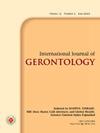Effects of Exercise on Myocardial Damage and Heart Failure Due to Hypoxia Induced by Obstructive Sleep Apnea
IF 0.3
4区 医学
Q4 GERIATRICS & GERONTOLOGY
引用次数: 0
Abstract
Obesity and intermittent hypoxia (IH) occurring during obstructive sleep apnea (OSA) are two independent risk factors for impaired ventricular function; cardiac dysfunction is exacerbated when the two factors co-occur. Regular exercise provides beneficial effects to attenuate cardiac fibrosis by reducing body fat percentage and preventing adipokine dysregulation. However, the mechanisms by which myokines, muscle-derived factors released during exercise, play a role in the prevention of IH-induced cardiac dysfunction, are still unclear. This study investigates the effects of myokines on ventricular dysfunction. The important role that myokines play in cardiac function in patients with OSA is discussed in the literature review. The conclusion of this study is that in obese individuals, excess adipose tissues trigger the dysregulation of adipokines. This dysregulation leads to myocardial inflammation, resulting in left ventricular dysfunction. Physical activity induces an increase in energy expenditure and triggers the release of myokines into the circulation by skeletal muscles, accelerating lipid metabolism, and improving the altered secretion profiles of adipokines. This process helps to alleviate myocardial inflammation and prevents the impairment of ventricular function. The paper suggests that future studies can investigate the effects of myokines on lipid metabolism, including how to reduce fat deposition and alleviate inflammation efficiently. In effect, muscle-derived cytokines (myokines) can be considered as anti-inflammatory mediators. This similarity provides support for advocating that regular exercise provides cardioprotective effects against cardiac function impairment in obese patients with OSA.运动对阻塞性睡眠呼吸暂停所致缺氧心肌损伤和心力衰竭的影响
阻塞性睡眠呼吸暂停(OSA)期间发生的肥胖和间歇性缺氧(IH)是心室功能受损的两个独立危险因素;当这两种因素同时发生时,心功能障碍加重。有规律的运动可以通过降低体脂率和防止脂肪因子失调来减轻心脏纤维化。然而,运动过程中释放的肌源性因子(myokines)在预防ih诱导的心功能障碍中发挥作用的机制尚不清楚。本研究探讨了肌因子对心室功能障碍的影响。文献综述中讨论了肌因子在OSA患者心功能中的重要作用。本研究的结论是,在肥胖个体中,过量的脂肪组织会引发脂肪因子的失调。这种失调会导致心肌炎症,导致左心室功能障碍。体力活动诱导能量消耗的增加,并触发骨骼肌向循环中释放肌因子,加速脂质代谢,改善脂肪因子的分泌谱。这一过程有助于减轻心肌炎症,防止心室功能受损。本文建议未来的研究可以探讨肌因子对脂质代谢的影响,包括如何有效地减少脂肪沉积和减轻炎症。实际上,肌肉来源的细胞因子(肌因子)可以被认为是抗炎介质。这种相似性为提倡定期运动对肥胖OSA患者心功能损害具有心脏保护作用提供了支持。
本文章由计算机程序翻译,如有差异,请以英文原文为准。
求助全文
约1分钟内获得全文
求助全文
来源期刊
CiteScore
0.60
自引率
0.00%
发文量
0
审稿时长
6-12 weeks
期刊介绍:
The Journal aims to publish original research and review papers on all fields of geriatrics and gerontology, including those dealing with critical care and emergency medicine.
The IJGE aims to explore and clarify the medical science and philosophy in all fields of geriatrics and gerontology, including those in the emergency and critical care medicine. The IJGE is determined not only to be a professional journal in gerontology, but also a leading source of information for the developing field of geriatric emergency and critical care medicine. It is a pioneer in Asia.
Topics in the IJGE cover the advancement of diagnosis and management in urgent, serious and chronic intractable diseases in later life, preventive medicine, long-term care of disability, ethical issues in the diseased elderly and biochemistry, cell biology, endocrinology, molecular biology, pharmacology, physiology and protein chemistry involving diseases associated with age. We did not limit the territory to only critical or emergency condition inasmuch as chronic diseases are frequently brought about by inappropriate management of acute problems.

 求助内容:
求助内容: 应助结果提醒方式:
应助结果提醒方式:


